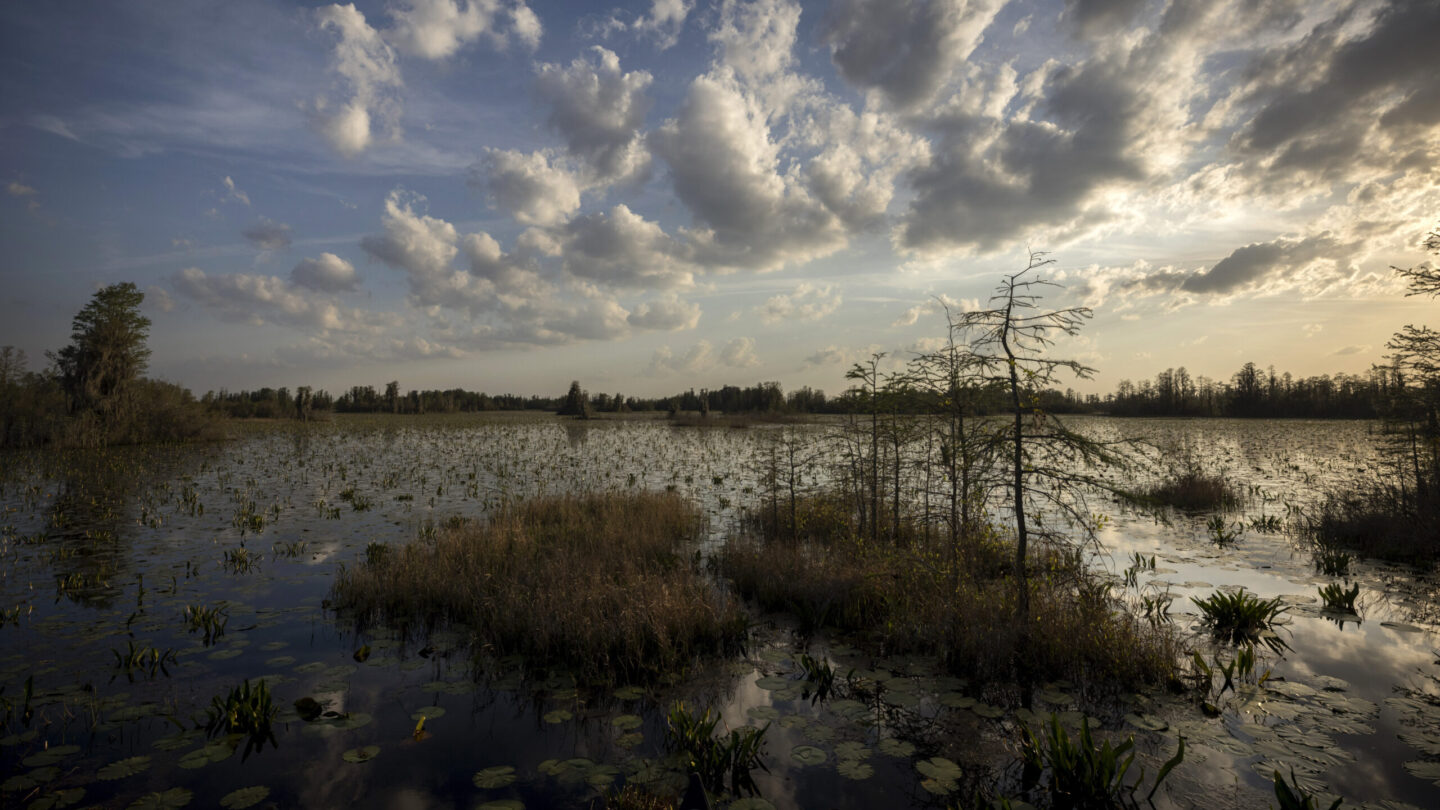This story was updated on Oct. 23, 2024, at 4:41 p.m.
The federal government is proposing a boundary expansion for the Okefenokee National Wildlife Refuge that would include area owned by Twin Pines, LLC, a company that’s pursuing a controversial plan to mine near the swamp.
The expanded boundaries could potentially make it easier for the government to eventually acquire the land where the mine is slated to go.
If the proposal for what the U.S. Fish and Wildlife Service calls a “minor boundary expansion” is approved, the agency would be able to pursue voluntary conservation efforts with landowners in the 22,000 acre area. The expansion also includes a one-mile “fuel reduction” zone, which would help the wildlife refuge manage the risk of wildfires.
The Fish and Wildlife Service says it would only buy land from willing landowners; there is no requirement for property owners within the area to participate.
The president of Twin Pines, Steve Ingle, wrote in an email to WABE that the federal proposal doesn’t affect his intentions.
“Today’s press release was the first we have heard of the proposal. We have not spoken with the US Fish and Wildlife Service and our plans to commence mining upon permit approval are unchanged,” Ingle said.
The move by the federal agency comes amidst an ongoing, years-long battle over his company’s proposal to mine for minerals, primarily titanium dioxide, on land just a few miles outside the current refuge boundary.
Twin Pines has long contended that its proposed mining methods would not have a negative impact on the Okefenokee.
But scientists and environmental advocates argue the mine on Trail Ridge, a natural formation that essentially acts as a dam containing one edge of the swamp, could disrupt the underground flow of groundwater that is essential to maintaining the Okefenokee. They say any such disruption could be devastating to the ecosystem.
“Without Trail Ridge, there is no Okefenokee National Wildlife Refuge or St. Marys River,” Bill Sapp, senior attorney at the Southern Environmental Law Center, said in a written statement. “By proposing to expand the boundary, the Fish and Wildlife Service acknowledges Trail Ridge’s importance to the wildlife and habitat the refuge was created to protect.”
The Georgia Environmental Protection Division is currently considering permits for the mine. The agency released draft permits earlier this year. In an email to WABE, the state agency did not say how or if the boundary proposal from the Fish and Wildlife Service would affect its work.
The federal government does not have jurisdiction over whether the mine can go ahead or not, but the Department of Interior has voiced opposition to it. Secretary of the Interior Deb Haaland wrote to Georgia Governor Brian Kemp in 2022, expressing her concern. Federal scientists have also weighed in. And earlier this year, the U.S. Fish and Wildlife Service asserted its legal rights to prohibit water diversions that could threaten the swamp or its wildlife.
This isn’t the first effort to conserve parts of Trail Ridge. In 2022 and 2023, a bill in the state legislature sought to protect land around the Okefenokee from future mining efforts. Despite broad bipartisan support, the bill never made it onto the floor for a vote.
An earlier mining proposal in the 1990s died when, after intense opposition, the company behind the project, DuPont, opted to instead donate some of the land in question to The Conservation Fund, which in turn donated land to the federal government.
More recently, a coalition of investors in the Chemours chemical company, a spinoff company from DuPont, have urged the business to agree not to participate in mining near the Okefenokee or to purchase minerals mined by others near the swamp. The U.S. Securities and Exchange Commission agreed to block a resolution that would have forced Chemours to allow shareholders to vote on the issue.
“I know first-hand the importance of public/private partnerships for securing the integrity of the Okefenokee,” attorney Josh Marks, who was involved in the effort to block DuPont’s mining plan in the ’90s and is also working against the current mining proposal, said in a written statement. “Now that the federal government has taken this critical step in the face of this latest mining threat, it’s now Governor Kemp’s turn to stop the review of TPM’s permit application and instead join in helping permanently protect Georgia’s greatest natural treasure.”
The U.S. Fish and Wildlife Service is collecting public comment on the boundary expansion proposal until Nov. 18. The agency will hold a public meeting on the proposal on Nov. 12 in Folkston, GA.
Note of disclosure: The date of the U.S. Fish and Wildlife Service public meeting has been moved to Nov. 12 after the date of this article’s publication.









